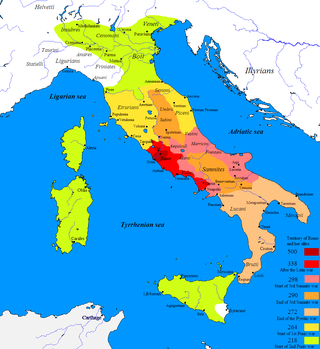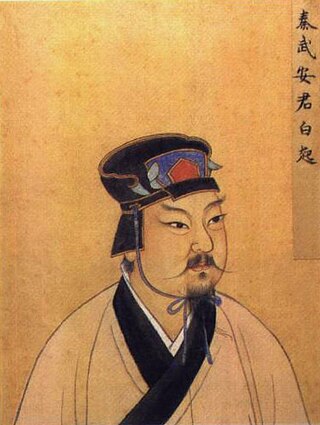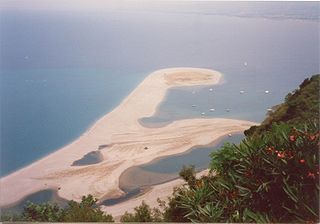Related Research Articles

In the Mediterranean Basin, the first few decades of this century were characterized by a balance of power between the Greek Hellenistic kingdoms in the east, and the great mercantile power of Carthage in the west. This balance was shattered when conflict arose between ancient Carthage and the Roman Republic. In the following decades, the Carthaginian Republic was first humbled and then destroyed by the Romans in the First and Second Punic Wars. Following the Second Punic War, Rome became the most important power in the western Mediterranean.
This article concerns the period 229 BC – 220 BC.

Year 264 BC was a year of the pre-Julian Roman calendar. At the time it was known as the Year of the Consulship of Caudex and Flaccus. The denomination 264 BC for this year has been used since the early medieval period, when the Anno Domini calendar era became the prevalent method in Europe for naming years.

This article concerns the 200 BC decade, that lasted from 209 BC to 200 BC.
This article concerns the period 269 BC – 260 BC.
This article concerns the period 259 BC – 250 BC.
Year 260 BC was a year of the pre-Julian Roman calendar. At the time it was known as the Year of the Consulship of Asina and Duilius. The denomination 260 BC for this year has been used since the early medieval period, when the Anno Domini calendar era became the prevalent method in Europe for naming years.
Year 204 BC was a year of the pre-Julian Roman calendar. At the time it was known as the Year of the Consulship of Cethegus and Tuditanus. The denomination 204 BC for this year has been used since the early medieval period, when the Anno Domini calendar era became the prevalent method in Europe for naming years.
Year 258 BC was a year of the pre-Julian Roman calendar. At the time it was known as the Year of the Consulship of Calatinus and Peterculus. The denomination 258 BC for this year has been used since the early medieval period, when the Anno Domini calendar era became the prevalent method in Europe for naming years.
Year 262 BC was a year of the pre-Julian Roman calendar. At the time it was known as the Year of the Consulship of Valerius and Otacilius. The denomination 262 BC for this year has been used since the early medieval period, when the Anno Domini calendar era became the prevalent method in Europe for naming years.
Year 292 BC was a year of the pre-Julian Roman calendar. At the time it was known as the Year of the Consulship of Gurges and Scaeva. The denomination 292 BC for this year has been used since the early medieval period, when the Anno Domini calendar era became the prevalent method in Europe for naming years.

The Warring States period was an era in ancient Chinese history characterized by warfare, as well as bureaucratic and military reforms and consolidation. It followed the Spring and Autumn period and concluded with the Qin wars of conquest that saw the annexation of all other contender states, which ultimately led to the Qin state's victory in 221 BC as the first unified Chinese empire, known as the Qin dynasty.

The Battle of Changping (長平之戰) was a military campaign during the Warring States period of ancient China, which took place from 262 BC to 260 BC at Changping, between the two strongest military powers, the State of Qin and the State of Zhao. After a bitter two-year stalemate, the battle ended in a decisive victory for Qin forces and the ruthless execution of most of the Zhao captives, resulting in an unrecoverable loss of manpower and strategic reserve for the Zhao state.

Qin was an ancient Chinese state during the Zhou dynasty. Traditionally dated to 897 BC, it took its origin in a reconquest of western lands previously lost to the Rong; its position at the western edge of Chinese civilization permitted expansion and development that was unavailable to its rivals in the North China Plain. Following extensive "Legalist" reform in the fourth century BC, Qin emerged as one of the dominant powers of the Seven Warring States and unified the seven states of China in 221 BC under Qin Shi Huang. It established the Qin dynasty, which was short-lived but greatly influenced later Chinese history.

Bai Qi, also known as Gongsun Qi (公孫起), was a Chinese military general of the Qin state during the Warring States period. Born in Mei, Bai Qi served as the commander of the Qin army for more than 30 years, being responsible for the deaths of over one million, earning him the nickname Ren Tu. According to the Shiji, he seized more than 73 cities from the other six hostile states, and to date no record has been found to show that he suffered a single defeat throughout his military career. He was named by Chinese historians as one of the four greatest generals of the late Warring States period, along with Li Mu, Wang Jian, and Lian Po; he is also remembered as the most fearsome amongst the four.

The Battle of Tyndaris was a naval battle of the First Punic War that took place off Tyndaris in 257 BC. Tyndaris was a Sicilian town founded as a Greek colony in 396 BC located on the high ground overlooking the Tyrrhenian Sea in the Gulf of Patti. Hiero II, the tyrant of Syracuse, allowed Tyndaris to become a base for the Carthaginians. The battle took place in the waters between Tyndaris and the Aeolian Islands, with Gaius Atilius Regulus in command of the Roman fleet. Subsequently, the town fell to Rome.

Wang Jian was a Chinese military general from the State of Qin during the Warring States period. Under his command, the Qin army conquered the states of Zhao, Yan, and Chu. He is considered one of the four greatest generals of the late Warring States period, along with Bai Qi, Lian Po and Li Mu.
King Zhaoxiang of Qin, or King Zhao of Qin (秦昭王), born Ying Ji (Chinese: 嬴稷, was the king of Qin from 306 BC to 251 BC. He was the son of King Huiwen and younger brother of King Wu.
The Âu Việt or Ouyue were an ancient conglomeration of Baiyue tribes living in what is today the mountainous regions of northernmost Vietnam, western Guangdong, and northern Guangxi, China, since at least the third century BCE. They were believed to have belonged to the Tai-Kadai language group. In the legends of the Tay people, the western part of Âu Việt's land became the Nam Cương Kingdom, whose capital was located in what is today the Cao Bằng Province of Northeast Vietnam. In eastern China, the Ouyue established the Dong'ou or Eastern Ou kingdom. The Western Ou were other Baiyue tribes, with short hair and tattoos, who blackened their teeth and are the ancestors of the upland Tai-speaking minority groups in Vietnam such as the Nùng and Tay, as well as the closely related Zhuang people of Guangxi.

Qin's wars of unification were a series of military campaigns launched in the late 3rd century BC by the Qin state against the other six major Chinese states — Han, Zhao, Yan, Wei, Chu and Qi.
References
- ↑ Qian, Sima. Records of the Grand Historian, Section: Bai Qi.